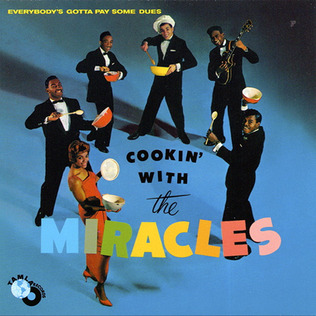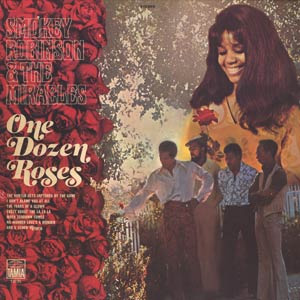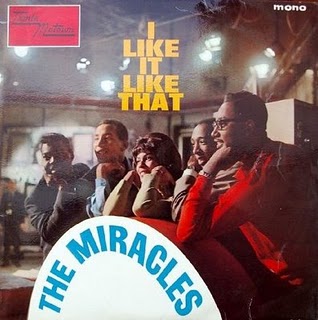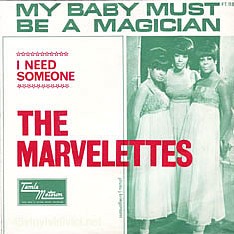Related Research Articles

The Miracles Doin' Mickey's Monkey is a 1963 album by The Miracles for the Tamla (Motown) label. It includes the group's Top 10 smash single "Mickey's Monkey", written and produced by Holland-Dozier-Holland. "Mickey's Monkey" popularized "The Monkey" as a novelty dance, and has been covered by several artists, including The Hollies, The Young Rascals and John Mellencamp. Also included is another H-D-H dance-oriented single, "I Gotta Dance to Keep From Crying", a Billboard Top 40 hit, which inspired a cover version by The Who.

I'll Try Something New is the third Tamla (Motown) album by The Miracles. The title track was an important early single for the group, featuring Smokey Robinson's lead voice, a chorus led by his wife Claudette and an orchestra of strings. Other hits like "What's So Good About Goodbye" and "I've Been Good To You" are included, plus three covers of the easy listening standards "I've Got You Under My Skin" written by Cole Porter, "On the Street Where You Live" from the Broadway musical My Fair Lady and "Speak Low" by Ogden Nash and Kurt Weill, on which both Smokey and Claudette Robinson sing lead. I'll Try Something New also features a rare lead by Miracles baritone Ronnie White on "A Love That Can Never Be", and a lead by Claudette Robinson on "He Don't Care About Me".

Cookin' with the Miracles is the second Tamla album by The Miracles, and their second of 1961. Berry Gordy and Smokey Robinson co-wrote most of the songs, including the two charting singles "Ain't It Baby" and "Everybody's Gotta Pay Some Dues". Another single, “Mighty Good Lovin’” b/w “Broken Hearted”, was issued in between those two. However, only “Broken Hearted” appears on the album, featuring a different vocal take to the single version. The album is composed mostly of upbeat R&B tunes with steady string riffs, like "Determination" and "Broken Hearted". A cover of the jazz standard "Embraceable You" by George & Ira Gershwin is also included. “That's The Way I Feel”, also from this album, was chosen for the soundtrack of the award-winning 1964 Ivan Dixon film Nothing But a Man.

Hi... We're the Miracles is the first album by Motown's first group, The Miracles, released on Motown's Tamla subsidiary label in the summer of 1961. It also has the distinction of being the first album ever released by the Motown Record Corporation The album features several songs that played an important role in defining The Motown Sound and establishing songwriters Smokey Robinson and Berry Gordy.
"A Fork in the Road" is a 1965 Motown song recorded by American R&B singing group The Miracles, and written by Miracles members Smokey Robinson, Pete Moore, and Ronnie White, on Motown Records' Tamla subsidiary label. (T54118) This song was included as the closing track on the Miracles' 1965 studio LP, Going to a Go-Go, and was also released as the B-side of their million-selling Grammy Hall of Fame hit single, "The Tracks of My Tears". Though this original version never charted nationally, it was a strong regional hit in many areas of the country and a popular part of the Miracles' live show.

One Dozen Roses is a 1971 album by Smokey Robinson & The Miracles, issued on Motown Records' Tamla label. The penultimate album before lead singer Smokey Robinson departed the group for a solo career, One Dozen Roses features the Top 20 Billboard Hot 100 hit single "I Don't Blame You at All". Also included is the group's number-one smash hit "The Tears of a Clown", which was also made available through the reissue of the 1967 Miracles LP Make It Happen as The Tears of a Clown. Both of these songs were also huge hits in England, reaching #11 and #1 respectively. The album's cover depicts Smokey,, picking a solitary rose for his wife, Miracles member Claudette Robinson, who is pictured on the cover holding the rose given her by her husband.
"A Breathtaking Guy" is a 1963 song written and produced by Smokey Robinson and released first by Motown singing group The Supremes (1963) and later by The Marvelettes (1972). The single was originally released under the title "A Breath Taking, First Sight Soul Shaking, One Night Love Making, Next Day Heartbreaking Guy" by The Supremes, but was shortened after its official release. All three Supremes members - Diana Ross, Florence Ballard and Mary Wilson - sang the chorus with the original title together.
"The Love I Saw in You Was Just a Mirage" is a 1967 song recorded by the American R&B group The Miracles on Motown Records' Tamla label. Written by Miracles members Smokey Robinson and Marv Tarplin and produced by Robinson, it is noted for being the first single to bill the group as "Smokey Robinson" & the Miracles, a billing already present on the group's albums by this time. Miracles members Smokey Robinson and Pete Moore were the song's producers.
"Mickey's Monkey" is a 1963 song recorded by the R&B group The Miracles on Motown Records' Tamla label. It was written and produced by Motown's main songwriting team of Brian Holland, Lamont Dozier, and Eddie Holland, who later went on to write 2 more Miracles hit singles, the Top 40 "I Gotta Dance to Keep From Crying", and the Top 20 "(Come 'Round Here) I'm The One You Need". This was unusual, as most Miracles songs were composed by the group members themselves.

"I'll Try Something New" is a song written by Smokey Robinson and originally released in 1962 by The Miracles on Motown Records' Tamla subsidiary label. Their version was a Billboard Top 40 hit, peaking at #39, and just missed the Top 10 of its R&B chart, peaking at #11. The song was released later as a joint single by Diana Ross & the Supremes and The Temptations, also becoming a charting version on the Billboard 100 pop singles chart, peaking for two weeks in April 1969 at number 25.
"Way Over There" is a 1960 Motown soul song and single, written by William "Smokey" Robinson, produced by Berry Gordy, and first performed by The Miracles for the Tamla (Motown) label. It was one of The Miracles' earliest charting singles, reaching #94 on the Billboard Pop chart. Motown president Berry Gordy, Jr. had The Miracles record the song several times during its chart run. The first version had minimal orchestration. The second version added strings, and this is the version played by most oldies stations today. Claudette Robinson had several lead parts on this song, answering Smokey's leads with chants of "Come to me, Baby". The song's B-side, "(You Can) Depend on Me", while not charting nationally, did become a popular regional hit in many areas of the country,and Smokey still sings it in his live shows today. "Way Over There" has inspired cover versions by Edwin Starr, The Temptations, The Marvelettes, The Royal Counts, The Spitballs, and Eddie Adams Jr, while "(You Can) Depend on Me" has inspired cover versions by The Temptations, The Supremes, Mary Wells, and Brenda Holloway. The song was also used for the title of Hip-O Select's 2009 compilation: The Miracles – Depend on Me: The Early Albums, which collects the first five LP releases by the group.

I Like It Like That is an album by Motown group the Miracles, compiled for the UK market and released on the UK Tamla-Motown label (TML11003) as one of its initial group of six albums in March 1965. Known as the Miracles' "forgotten album", few people, outside of Motown insiders, hard-core Miracles fans, and collectors, remember that it had even existed. This album featured a combination of several new-for-1964 songs along with previously issued material from the group's album from the year before, The Miracles Doin' Mickey's Monkey. New for 1964 songs included "I Like It Like That", the Bobby Rogers-led flip side "You're So Fine and Sweet,"(this is the only original Miracles studio album that has that song), "That's What Love Is Made Of", another 1964 hit that the group performed on the American International Pictures release, the T.A.M.I. Show that year, and "Would I Love You", a song that became a popular regional hit tune for the group in Pennsylvania and The Midwest. The album also featured a Claudette Robinson-led cover version of the Orlons' #2 Pop smash, "The Wah-Watusi"., and the group's 1963 Top 40 Hit, "I Gotta Dance to Keep From Crying". Several of the group's other 1964 songs, including the chart hits "(You Can't Let the Boy Overpower) The Man in You", "Come On Do the Jerk", and its "B" side, "Baby Don't You Go", were not included. The new 1964 recordings "I Like It Like That", "Would I love You" and "That's What Love Is Made Of" were included on the only US Miracles 1964 album release "Miracles Greatest Hits From The Beginning" which was the first double album released by Motown Records.

"My Baby Must Be a Magician" is the title of a 1967 single release by the Marvelettes which was written and produced by Smokey Robinson.
"That's What Love Is Made Of" was a 1964 hit song by Motown's original vocal group, The Miracles, issued on the label's Tamla records subsidiary. It was taken from the group's album Greatest Hits from the Beginning, but originally appeared on their abortive 1964 album, I Like It Like That.
"Choosey Beggar" was a 1965 song recorded by Motown R&B group The Miracles on its Tamla label subsidiary. It was issued as the B-side of the group's top-20 million-selling single, "Going to a Go-Go", and was taken from the group's Billboard Top 10 Pop album of the same name.
"(You Can) Depend on Me", was a 1959 song by Motown Records group The Miracles, which also appeared on the group's first album, Hi... We're The Miracles. It also appeared as the "B" side of the group's hit single, Way Over There. It was written by Motown Records' President and founder Berry Gordy and Miracles member William "Smokey" Robinson. While not charting nationally, this song was a very popular regional hit tune in many areas of the country, so much so, in fact, that it was included on the group's first greatest hits album, Greatest Hits from the Beginning, and Smokey still sings it, by request, in his live shows today.
"Point It Out" is a 1969 recording by Motown Records R&B group The Miracles on that label's Tamla subsidiary. This mid-tempo song was a national Billboard Top 40 Pop hit, reaching #37 on the Hot 100, and was a Top 10 R&B hit was well, reaching #4. It was taken from their album "A Pocket Full Of Miracles", and was written by Miracles members William "Smokey" Robinson and Marv Tarplin, along with Motown staff songwriter Al Cleveland.

Four In Blue is a 1969 album by the Motown R&B group The Miracles, issued on the label's Tamla Records subsidiary in the U.S., and the Tamla-Motown label elsewhere in the world,, and was the final Miracles album of the 1960s. It reached #78 on the Billboard pop album chart, and reached the Top 10 of Billboard's R&B Album chart, peaking at #3, despite the fact that no singles were released from this album in the U.S. or the UK.
"(You Can't Let the Boy Overpower) The Man in You" is a 1964 R&B song by The Miracles on Motown Records Tamla subsidiary label. This song was written by Miracles lead singer Bill "Smokey" Robinson, and was produced by Robinson and Motown President/founder Berry Gordy Jr.. One of several gospel-styled call and response tunes the group issued in 1964, this song reached #59 on the Billboard Pop chart, and the top 20 of the Cash Box R&B chart, peaking at #12. The song was recorded on August 17, 1963, and was the group's first single release of 1964.*
We've Come Too Far to End It Now was a 1972 single by Motown Records R&B group The Miracles on its Tamla Label subsidiary (T54220F) and taken from their 1972 album, Flying High Together, the group's final studio album with original lead singer Smokey Robinson. This song charted at #46 on the Billboard Pop Chart, and reached the Top 10 of its R&B chart, peaking at #9.
References
- ↑ https://www.allmusic.com/album/r48111
- ↑ Depend on Me: The Early Albums [liner notes]. New York: Hip-O Select/Motown/Universal Records
- ↑ https://www.allmusic.com/album/r495531
- ↑ https://www.allmusic.com/album/r12493
- ↑ Clemente, John (2013). Girl Groups: Fabulous Females Who Rocked the World (Paperback ed.). AuthorHouse. pp. 334, 335. ISBN 978-1-4772-7633-4 . Retrieved October 9, 2015.